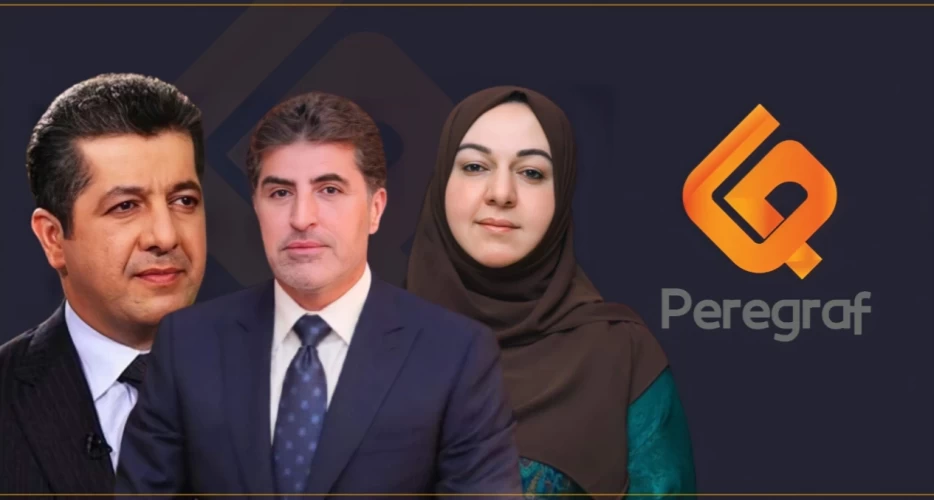Peregraf files lawsuits testing KRG commitment to freedom of information and transparency

Peregraf
Peregraf has filed three lawsuits with the Sulaimaniyah Court of First Instance in relation to a freedom of information petition made on June 28, 2022 about expenditures by the offices of the Kurdistan Region’s top government officials.
Peregraf’s editor-in-chief’s Surkew Mohammed said that the purpose of the petition and the lawsuits are to test the commitment of the Kurdistan Region’s leadership and the courts to "three important issues that they constantly emphasize: providing information to journalists, rule of law, and transparency."
In mid-May, Peregraf sent requests to the offices of Kurdistan Region President Nechirvan Barzani, KRG Prime Minister Masrour Barzani, and Kurdistan Parliament Speaker Rewaz Fayaq — collectively known as the "Three Presidencies" — seeking information about how they have spent public funds since June 10, 2019, when the current term of the Kurdistan presidency began.
None of those offices responded to the public interest request at the time.
On June 28, Peregraf sent letters through Sulaimaniyah’s notary office, which is part of the Kurdistan Regional Government (KRG) Justice Ministry, formally requesting the information under procedures outlined in the Right to Obtain Information Act (No. 11, 2013).
Under Article 7 of the law, the recipient government offices had ten days to respond to the petition, but all three failed to do so by the deadline.
Peregraf then resorted to the courts to obtain a resolution. It filed lawsuits against President Barzani and Prime Minister Barzani on August 4 and Speaker Fayaq on August 24.
The lawsuits ask the court to oblige the defendants to provide the information requested in the June 28 letter.
The first hearing in the case is scheduled for September 6. The court has issued a formal notice for the three defendants or their lawyers to appear.
Karzan Fazil, a lawyer and head of the Democracy and Human Rights Development Centre (DHRD), is representing Peregraf in the case.
"According to our information, this is the first request to be filed under the Right to Obtain Information Act," Fazil said. "It is an important step towards implementing this important law, which has been neglected since it was passed in 2013."
"These three requests are for the court to enforce the procedures stipulated in the law in order to obtain information and achieve transparency," he added.
Following the law
The Kurdistan Parliament passed the Right to Obtain Information Act nearly a decade ago, but KRG ministries and departments and the Kurdistan Parliament have not fully implemented it.
Under the law, everyone has the right to request and obtain information from the KRG and government offices, except regarding matters carved out under Article 14 including security, defense, personal information, and information that would violate intellectual property rights.
Speaker Fayaq referred to Peregraf’s lawsuits in a meeting with civil society groups in Sulaimaniyah on Saturday and criticized the executive branch.
"There is a complaint against me because of the failure to enforce the [Right to Obtain Information Act]. If there are no guidelines for this law, it cannot be implemented," Fayaq said.
"The government does not give instructions because there is an opinion within the government's philosophy that believes that this law is too open," the speaker continued, adding that she is reluctant to open the law up to amendment to address this issue because the executive would seek to dilute the law.
"I will not bring this flaw to the fifth term of parliament," she declared.
Fayaq confirmed that she would respond to the lawsuit against her and send a lawyer to court on September 6.
After the speaker’s remarks were reported by media outlets, KRG Spokesperson Jotiar Adil responded that the KRG had no intention of changing the law.
"We hereby declare that the ninth cabinet of the Kurdistan Regional Government has no such desire and has not made any such request to the Kurdistan Parliament to amend the law," Adil said on Sunday.
"The KRG reaffirms its commitment to transparency in disseminating information," he said, pointing to Directive Number 157, issued by Prime Minister Barzani on June 22, as evidence.
He said that the directive called for the Presidency of the Council of Ministers, the Secretariat of the Council of Ministers, the Department of Media and Information, and the Independent Human Rights Commission to draft plans to implement the Right to Obtain Information Act.
"We thank the speaker of the Kurdistan Parliament for expressing her support for issuing guidelines two and a half months after the prime minister's decision," the spokesperson added.
Prime Minister Barzani took office in July 2019 following an extended government formation process after the 2018 regional elections and is nearing the end of his mandate.
While Barzani’s government frequently proclaims its commitment to reform, transparency, and human rights, the reality is starkly different. According to human rights groups, freedom of expression and the press have declined under his watch. Practical reforms encouraging transparency have been limited.
Journalists are routinely unable to obtain important information from government ministries and departments.
As a matter of practice, Peregraf routinely asks KRG spokesperson Adil for information and statements for inclusion in its reports, but he often does not respond.